- Home
- Marcia Talley
All Things Undying Page 2
All Things Undying Read online
Page 2
‘It’s OK to freak out.’ Susan smiled. ‘Do you want me to go on?’
I clutched the shopping bag from Simon Drew to my chest, wrinkling the heck out of the caricature of Rabbit printed on its side, and considered Susan’s question for maybe two and a half seconds. ‘Yes,’ I said, blinking back tears.
‘Your mother’s saying she’s fine, she’s not in pain anymore . . .’ Susan paused for a moment, just long enough that I began to worry. ‘There must be another sister.’
Oh. My. God. Susan Parker knew about Ruth, too. I’d walked out of the fanciful world of Simon Drew and straight into the Twilight Zone. ‘Uh huh,’ I croaked, trying to swallow the lump that was suddenly taking up too much space in my throat.
Susan laid a gentle hand on my arm. ‘Your mother wants you and your sisters to know that she loves you very much.’
‘Uh huh,’ I sniffed.
‘Do you need a tissue?’
‘Thanks.’ While I wiped my eyes and blew my nose with the tissue thoughtfully produced from the depths of Susan’s leather handbag, I tried to make sense out of what had just happened.
‘Are you OK?’ she asked.
‘How . . .?’ I began.
Susan shrugged. ‘I don’t know,’ she said. ‘I honestly don’t know. It just happens.’
As if to punctuate her comment, the bells of St Saviour’s Church began to chime the hour. Susan jumped as if she’d been shot. ‘Sorry, I’ve got an appointment. Have to run. Are you going to be all right?’
‘I think so,’ I said, tucking the soggy tissue into my shopping bag. ‘It’s just a lot to take in all at once.’
‘It was lovely to meet you,’ Susan said, extending her hand, smiling. ‘And your mother!’
Rabbit appeared just then, checking out the shoppers, no doubt, snuffling noisily around my ankles as if I’d recently misted them with Eau de Boeuf. I bent to give the dog a pat. By the time I’d ordered Rabbit not to be such a beggar and sent him back to his owner, the embroidered sunflower on the back of Susan Parker’s jacket was disappearing around the corner of Union Street.
‘Wait a minute! There’s something I want to ask you!’ Gathering my wits about me once more, I set off at a trot in the direction of Market Square searching for Susan, but she had vanished into the crowds that clustered around the market stalls selling everything from fresh raspberries to ‘designer’ handbags.
Still in a fog, I made my way to the market tea room where I bought a cup of cappuccino, sat down at a table by myself and sipped it very, very slowly, feeling sorry for myself.
I was sprinkling a second packet of demerara sugar over the foam when it occurred to me. Susan Parker sounded exactly like Sue Scott playing the Lutheran Lunch Lady on Prairie Home Companion. She was an American.
TWO
‘Horn Hill House is a fully restored Grade II listed Georgian townhouse perched on a hill overlooking the River Dart. Four en-suite bedrooms are offered, each with a colour television, a mini-cooler and a hair dryer. Fresh milk, leaf tea, ground coffee, and tea cakes are also provided. Natural cotton bedding and non-allergenic pillows have been specifically chosen to ensure each guest a good night’s sleep. Special diets are catered for using, when available, organic produce.’
www.DiscoverDartmouth.com
I honestly don’t remember how I got back to our B&B on Horn Hill, but I must have made the right turn on to Anzac Street, skirted St Saviour’s Church, and passed right by the Singing Kettle without even thinking about stopping for tea, which only goes to show how preoccupied I was because a cream tea at the Singing Kettle is a near religious experience, even if you’ve just finished a cappuccino.
Somehow, I made my way into Higher Street and turned right for the long climb up Horn Hill, one of the many stepped thoroughfares for which Dartmouth is famous. Horn Hill House was near the top, on the left, through a gate and up five additional steps along a narrow alleyway that opened into a well-tended garden.
When I snapped out of my daze, I found myself standing on the doorstep of Horn Hill House, fumbling in my handbag for the old-fashioned key with its unusual Buddha-shaped fob. Unlocking the door required two hands, so I tucked my packages under my arm, slotted the key into the lock, and turned both the key and the doorknob at the same time.
The door swung open on noisy hinges, and I stumbled into the tiny vestibule. I’d taken two steps in the direction of the narrow, twisting staircase that led to our room on the floor above when a door opened to my right. ‘Hannah?’
It was Janet Brelsford, our proprietress, looking super smart in a fuchsia scoop-neck T-shirt tucked into fashionably faded jeans with a razor-sharp crease.
‘Sorry, Janet. I didn’t mean to disturb you.’ I jingled the key. ‘I’ll get the hang of the door eventually!’
Janet laughed. ‘I have no doubt of that. Can you come in for a moment? I’ve got something to show you.’
Paul and I had been in Dartmouth only a few days, but Janet and I had already become friends. From the minute we stepped over the threshold of Horn Hill House, Janet Brelsford and her husband, Alan, had made us feel like family. Janet cooked for us like family, too, if your family includes a Paris-trained Cordon Bleu chef among its members. Alan, a Francophile himself, managed to complement every meal with a fine Savigny Les Beaune Cuvee, a Sauvignon de Saint Bris or some other nearly unpronounceable vin extraordinaire, produced with a flourish from the depths of a wine cellar he kept locked with a key the size of a handgun.
‘I hope you don’t mind,’ Janet continued, easing the door to their sitting room a bit wider, ‘but when I was changing the linen in your room just now, I noticed your knitting.’
I had been contemplating a hot bath – a long, brain-sorting think in the claw-foot tub tucked into an alcove of our comfortable en suite – but suddenly, talking about knitting seemed a pleasant distraction. I dropped the keys into my bag. ‘It’s not a particularly ambitious project,’ I told her. ‘Slip one, knit one, pass stitch over on the even rows. It’s called a healing shawl. I knit them for cancer survivors. Almost as good as a hug.’
‘We make them here, too,’ Janet said. ‘Comfort shawls we call them.’ She waved a hand toward a flowered chintz-covered sofa. ‘Speaking of which, make yourself comfortable. I’ve just put the kettle on. Would you care to join me?’
After all the coffee I’d had at the market, my eyeballs were floating, but I found I was craving company, so I caved. ‘Tea would be perfect. Lady Gray, if you have it.’
Janet smiled. ‘My favorite, too. Just a tick!’
While Janet bustled around in the kitchen of the ground floor apartment she shared with her husband and two young daughters, I sank gratefully into the sofa, rested my head against the upholstery and stared at the coffered ceiling, embossed with curling vines. What had happened only minutes before already seemed like a dream. Still, it unnerved me. I should tell Paul, of course, but he’d groan, roll his eyes and make Twilight Zone noises. Ruth would be right on board, of course, but my older sister was back in Maryland, probably feng shui-ing the heck out of somebody’s house. For a woman who believed that mirrors could repel evil spirits, talking to ghosts wasn’t a huge leap.
‘Here we go!’ Janet returned, carrying a tray on which she’d arranged a teapot, two mugs, a sugar bowl and a jug of milk. Balanced on top of the milk jug was a plate of chocolate digestives, a kind of flat, round graham cracker frosted with chocolate. She set the tray carefully on the footstool in front of me. ‘Shall I be Mother?’ she asked.
‘Absolutely. I’m dangerous. Whenever I pour, the top of the teapot has a tendency to fall into the cup.’
Smiling, Janet filled my mug with tea. ‘Milk?’
‘No thanks,’ I replied. ‘A weird American thing, I know, but I like my tea plain. No sugar either.’
‘Black, then. Here you go.’
I accepted the steaming mug, wrapped both hands around it, and sipped carefully. ‘You wanted to show me something, Janet?’
&n
bsp; ‘Right!’ Janet groped about in the space between the sofa and the wall, retrieved a basket by its handles and set it on her knees. ‘Since you’re a knitter, too, I thought you’d be interested in this project I’ve just finished. It’s knit from the wool of a sheep I met up in Somerset.’ She lifted a sweater from the basket and spread it out on the sofa between us, smoothing it gently.
The sweater was an oatmeal-colored turtleneck; intricate cables snaked across the chest and down each sleeve. ‘Gorgeous!’ I set my mug on a coaster on the end table, picked up a sleeve and rubbed the wool appreciatively between my fingers. ‘I love how you can feel the lanolin.’
While I fondled the material, Janet rose, crossed the carpet to the fireplace and picked a snapshot off the mantle. ‘This is Sheila. She’s a North Ronaldsay.’ Janet handed the photograph to me. An animal – half sheep and half shaggy dog – gazed out of the frame with dark, soulful eyes. ‘It’s a fairly rare breed originally from Orkney,’ she explained. ‘A friend of mine keeps a small herd on her farm near Bradford on Avon.’
I looked up from the photo. ‘This is her wool?’
Janet chuckled. ‘The sheep’s, not my friend’s!’
‘I’d rather be working with Sheila’s wool than the synthetic crap you saw upstairs,’ I said. ‘But some people are allergic to wool, poor things. Not that I’m going to be working on anything in the immediate future, anyway. Some humorless Neanderthal confiscated my knitting needles at the security checkpoint at BWI.’
‘You’re joking! I thought they rescinded that rule.’
‘Maybe the agents at BWI didn’t get the email. I don’t suppose there’s a yarn shop nearby?’
‘Sorry.’ She returned the snapshot to its place on the mantle, propped up next to a framed photograph of her twins, Samantha and Victoria, age six. ‘What size needles do you need?’
‘Eleven.’
‘Eleven? For that shawl?’ Her forehead creased in puzzlement.
It took me a couple of seconds to figure out what the problem was. In the States, the fatter the needle, the higher the number. In the UK, the same rule applied, but they used metric numbers. I wondered if I was asking for a needle the size of a walking stick, useful if you’re knitting socks for Bigfoot, I suppose, but not much else. Fortunately, I remembered a second number that had been stamped into the steel of the knitting needles now likely resting under a ton of garbage at the bottom of some dumpster back at BWI. ‘Eight millimeters?’
‘Not a problem, then. I’m sure I have a pair around somewhere. I’ll leave them in your room, shall I?’
‘Would you? That would be very kind!’ I reached for one of the digestives. ‘Is Paul back yet? He went off to share a pint with two former colleagues. By my estimation, that was three pints ago.’
‘I haven’t seen him, but I went to fetch the girls from their piano lesson, so he may have slipped in while I was out.’ Janet sat down, picked up her mug and studied me over the top of a pair of pink plastic reading glasses, perched precariously near the tip of her nose. ‘You look worried. I’m sure he’s just fine.’
I managed a smile. ‘Paul’s a big boy. I let him cross the street by himself and everything now. It’s just . . . well, the craziest thing just happened to me.’ Setting my tea aside for a moment, I told her about my encounter with Susan Parker on Foss Street. ‘It so unnerved me that I don’t even remember walking back here. I hope nobody saw me,’ I added quickly. ‘I was probably reeling like a drunk.’
‘Susan Parker? I’m surprised you haven’t heard of her.’
‘Really, why?’
‘She’s rather famous. Even has a television show on ITV.’
‘Get out!’
Janet selected another digestive for herself and bit into it. ‘I haven’t seen every broadcast, of course, too much going on around here most times, but she can be jolly amazing.’ She licked a crumb from her lip. ‘Her program’s called Dead Reckoning.’
‘She talks to the dead for a living, then.’
Janet smothered a laugh with her hand.
‘What’d I say?’
‘Sorry. It just struck me as funny.’ She waggled a hand. ‘Dead. Living.’
I chuckled, too. After a moment I asked, ‘Do you really believe in that sort of thing, Janet?’
Janet shrugged. ‘Fake mediums are a dime a dozen. But Susan? She’s the genuine article.’ Before I could digest that remark, she hurried on. ‘You wouldn’t know she’s such a star, would you, when you see her in person?’
‘True. At first, I thought she was collecting for charity.’
Janet chuckled. ‘Susan is so down to earth. She lives on Ridge Hill Road. If you’re up and out early enough, you’ll meet her walking Bruce along the Embankment just like regular people.’
‘Bruce?’
‘Her dog. A border terrier.’
I’d always liked border terriers, ever since Puffy upstaged all the human actors in the movie There’s Something About Mary. ‘Bruce? What an odd name for a dog.’
‘He’s named after Bruce Springsteen,’ Janet explained. ‘You know, “Born in the USA”.’
I had to laugh. Naming a dog after The Boss would never have occurred to me. ‘You sound like you know her.’
‘Sorry? Oh, yes, I do. We volunteer for the Christian Aid Lunch at St Saviour’s Church. It’s at noon on Tuesday, by the way, if you’d like to come. Not much of a meal, if you want to know the truth. Sandwiches, veggies, tea and cakes, that sort of thing. Only a pound, but I like to chuck in another quid or two for the cause.’
‘I’d love to,’ I said. ‘Will Susan be there?’
‘I doubt it. She stopped coming a while back. Could have been her busy schedule, of course, but I know she found some of the parishioners a bit off-putting.’ Lifting the teapot with one hand and securing the lid with two fingers of the other, Janet topped off my mug. ‘Susan ruffled quite a few feathers when she bought St Anthony’s and converted it into flats.’
I remembered St Anthony’s, a solid, Victorian-era church near the intersection of Clarence Street and College Way, not far from the river. ‘It was made redundant?’
Janet drew quote marks in the air. ‘Surplus to requirements. Available for disposal. It just about broke my heart.’ She helped herself to another biscuit. ‘A pity, that, but what can you do?’ She shrugged. ‘St Anthony’s was down to a handful of parishioners. If they ever got double digits at a service, Christ himself would have climbed down from the cross to congratulate the vicar. A beautiful old building, really. Neo-Gothic. Forty-five hundred square feet, give or take, so Susan’s architect had a lot to work with. It’s four flats now.’ After a moment, she added, ‘Susan surprised us, didn’t she?’
‘How’s that?’
‘Everyone thought she’d be taking the flat with the rose window, the one that faces east over the Dart, not that you’d get much of a view out of it, but the sunrise would be spectacular. But, no. Her flat’s on the south side where the special windows are.’
The way Janet emphasized ‘special’ made me wonder if said windows were endowed with supernatural powers, like the Grotto at Lourdes. I had to ask. ‘What do you mean, “special”?’
Janet leaned toward me and lowered her voice, speaking in a reverent whisper. ‘When the builders started pulling down the interior walls, they uncovered a pair of Byrne-Jones windows that somebody had covered up with plasterboard during the Second World War. A Miriam and a David, they were, smaller versions of the ones up at St Michael’s and All Angels in Hertfordshire. They’re part of Susan’s sitting room now.’
Byrne-Jones windows? I was astonished, and said so. ‘How could anyone simply forget a Byrne-Jones window? They’re classic! Trinity Church in Boston has one of his windows. The Adorations of the Magi. I’ve seen it, and it’s glorious.’
Janet shrugged. ‘Alan claims that Byrne-Jones was hopelessly out of fashion by the 1930s. Perhaps nobody missed them.’
‘What brought Susan Parker to Dartmouth, do you k
now? It seems a long way out of London. I presume that’s where she tapes her show.’
‘Three hours. But you’ll remember that from before, Hannah. Catch the eight-fifteen out of Totnes and you’re in London well before noon. People have been commuting from London to Dartmouth for at least a century of weekends.
I remembered that, too. ‘The English Riviera,’ I said, quoting a popular guidebook.
Someone says ‘Dartmouth’ and you think ‘sailing’. But sailors aren’t the only types attracted to this splendid little corner of the world. Writers, poets, artists, and musicians have all found inspiration in Devon – it’s that kind of place.
‘We certainly have had our share of celebrities buying holiday homes down here,’ Janet continued, ticking them off on her fingers. ‘Samuel Taylor Coleridge. Rudyard Kipling. Edmund Crispin. Daphne du Maurier.’ She paused for breath. ‘No, hold on. Du Maurier lived in Cornwall, didn’t she? And Agatha Christie, of course.’ She caught her breath. ‘Hannah!’
She spoke my name so sharply that I sloshed tea over the rim of my mug. Was there a spider crawling up my sleeve? A rattlesnake coiled at my ankles ready to strike?
‘Sorry! Didn’t mean to startle you,’ she said, handing me a napkin. ‘I suddenly remembered that the National Trust opened Christie’s home to the public just last month, and I know what a fan you are of mysteries, so I wanted to make sure you knew.’
‘Greenway House is on the top of my to-do list,’ I said with a smile. ‘Cut my teeth on Nancy Drew, then graduated to Christie. Never looked back. Visiting Greenway is a kind of pilgrimage, I suppose. Not sure about Paul, though. He’s more of a Grisham fan.’
‘When you go, take the ferry,’ Janet suggested. ‘It’s a wonderful trip. Besides, Greenway gives you a discount if you travel by green transport.’
‘We’ve got National Trust membership,’ I told her, patting the outside pocket of my handbag where I kept the magic National Trust get-into-just-about-anything-free card.

 Unbreathed Memories
Unbreathed Memories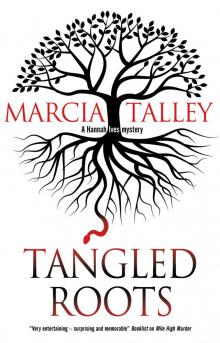 Tangled Roots
Tangled Roots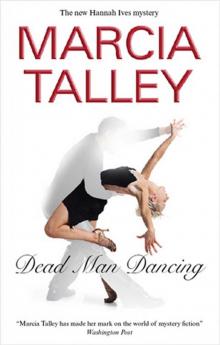 Dead Man Dancing
Dead Man Dancing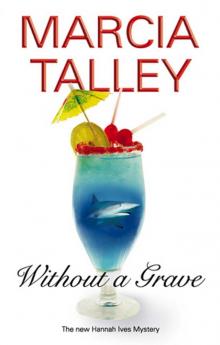 Without a Grave
Without a Grave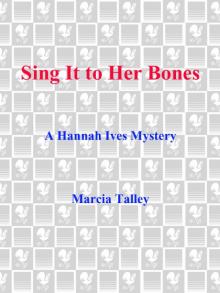 Sing It to Her Bones
Sing It to Her Bones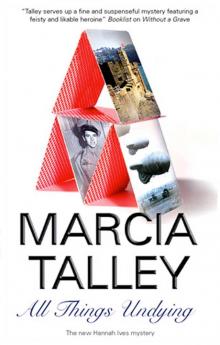 All Things Undying
All Things Undying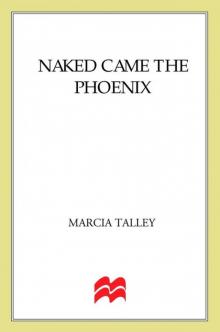 Naked Came the Phoenix
Naked Came the Phoenix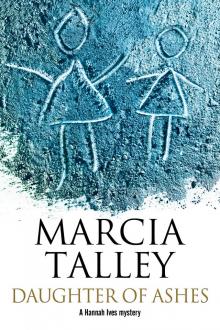 Daughter of Ashes
Daughter of Ashes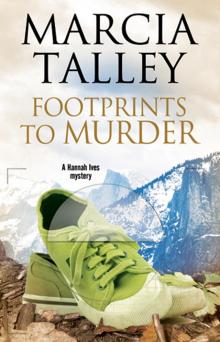 Footprints to Murder
Footprints to Murder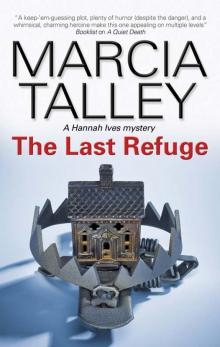 The Last Refuge
The Last Refuge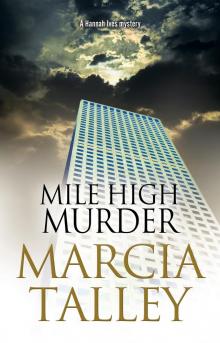 Mile High Murder
Mile High Murder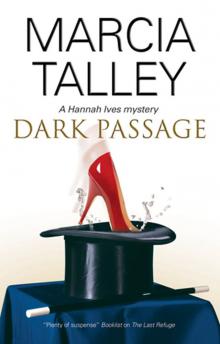 Dark Passage
Dark Passage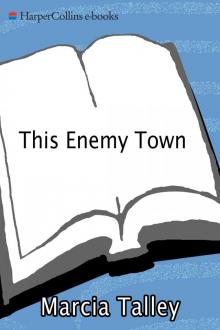 This Enemy Town
This Enemy Town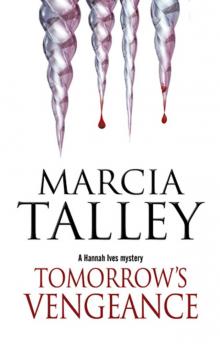 Tomorrow's Vengeance
Tomorrow's Vengeance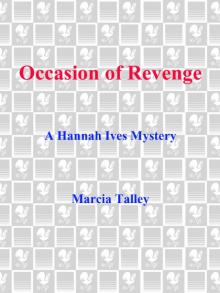 Occasion of Revenge
Occasion of Revenge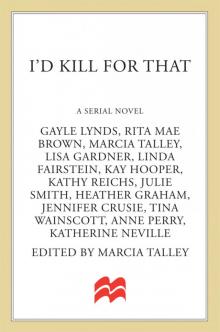 I'd Kill For That
I'd Kill For That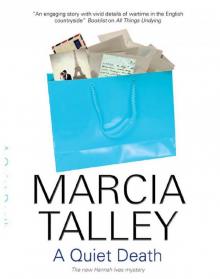 A Quiet Death
A Quiet Death